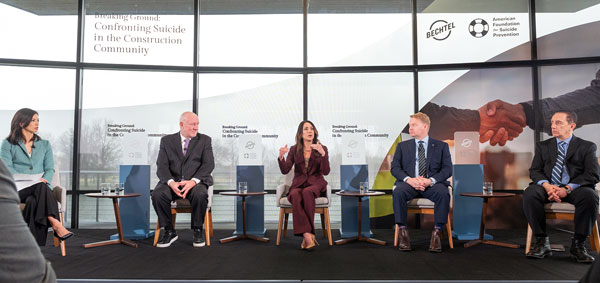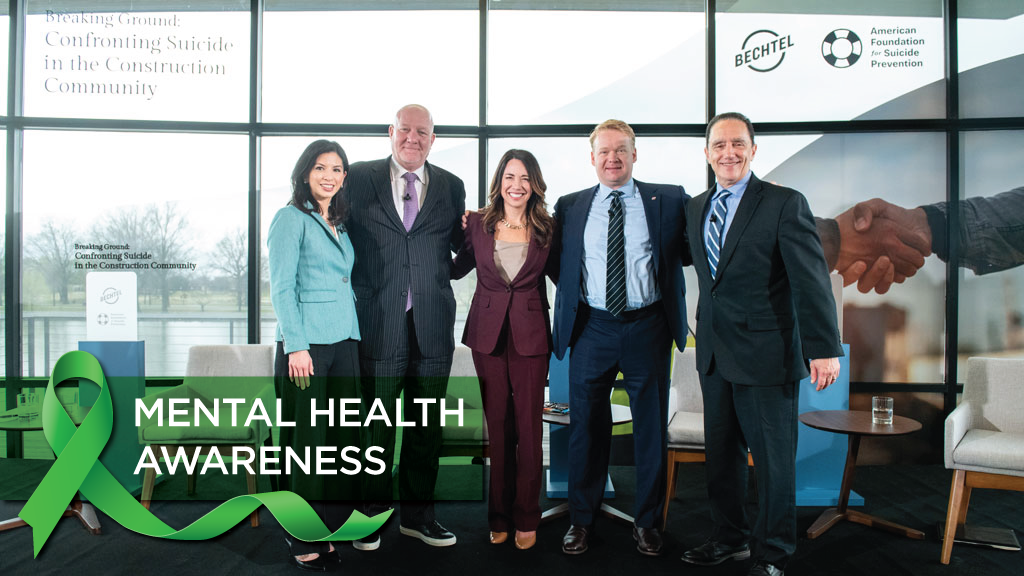A dramatic rise in the number of workers in the U.S. construction community who’ve killed themselves has prompted and the (AFSP) to team up on a multi-year partnership dedicated to tackling the issue and saving lives in the industry.
The global engineering and construction company has committed to providing $7 million for critical resources and programming to help half a million U.S. construction workers over the next five years.
The initiative, unveiled recently at an event in Washington, D.C., is aimed at educating stakeholders about the crisis and beginning to build a coalition to prevent construction worker suicides.
It is the largest-ever pledge received by AFSP and the largest single donation ever made by the Bechtel Group Foundation.
��
‘The next frontier in taking care of each other’
“The people that choose to make their careers in our industry are incredible people and I’m proud to call them my family, my friends, my colleagues,” Bechtel chairman and CEO Brendan Bechtel says. “These are strong, resourceful, hard-working people. They’re proud people. They tend, on average, to be overwhelmingly men, masculine, fit, macho. But the impact of mental health challenges, and specifically suicide on those people is being felt at a disproportionate rate.
“We invest hundreds of millions of dollars every year in keeping our people physically safe on our projects. But then one of our colleagues might go back to their room at a construction camp and take their own life.”

Bechtel explains the initiative is the start of a long-term, sustained effort to lift-up the whole construction community.
“We want to see mental health become as much of a priority as physical safety in our industry. It’s our belief that addressing suicide in construction is as vital as wearing a hard hat onsite. This is the next frontier in taking care of each other.”�� �� ��
The construction industry has one of the highest suicide rates of any profession in the U.S. Suicides in the industry are nearly five times higher than the number of lives lost in jobsite safety incidents, according to data from the and
“There’s a lot to be learned from that,” Bechtel says, “because as an industry we have been so successful in driving down site accidents over the last 30-plus years that we’ve now earned the right, I think, to push on to the next frontier of physical safety, mental health well-being and really get after this.”
‘I have lost colleagues to suicide’
With a massive infrastructure boom underway in the U.S, there will be massive demand and pressure on construction workers, he says, so the timing of the new partnership is critically important.
Teaming up with the AFSP on specific programming was important, Bechtel notes, because the construction company knows a lot about the industry but not a lot about suicide prevention.
“As I was coming up in my career, as a site manager, project manager, I have never in my career lost a direct colleague to an industrial accident on a site I was responsible for. I have lost colleagues to suicide on projects that I led. We’re at this moment now where I think there’s a broader discussion around mental health and suicide prevention.”
Sean McGarvey, president of , says 15 or so years of an opioid crisis in construction and also COVID-19 unfortunately caused a dramatic jump in suicides, and there’s now greater acceptance that people are struggling with mental health issues.
He says it is not easy for people who work in the industry to admit they are struggling or don’t feel right as it is pervaded by a macho culture.
“The other complicating factor for the construction is with our members. The way collective bargaining works, there’s no paid holidays, there’s no paid sick days, your mother dies you don’t get paid to bury her, you don’t get paid for Christmas, you’re not paid for your birthday. You get paid for the hours that you work so you are incentivized whether you’re dinged up or banged up to keep going and keep on the job.
“That can lead down various different paths – bad paths – whether it’s alcohol abuse or drug abuse, whatever’s going to keep you getting out of that truck every morning and being productive.”
Partnership forms a construction working group
The new initiative will leverage Bechtel’s industry knowledge and reach in combination with AFSP’s expertise in research, education and effective prevention strategies, as well as its national network of local chapters.
The partnership forms a construction working group and a first-ever senior advisory council to help guide the effort. Bechtel is encouraging others in the industry to join the effort.
Robert Gebbia, CEO of AFSP, says the partnership with Bechtel is the first of its kind for the organization.
“We are thrilled to be collaborating with an industry leader that is focused on improving the mental health of the construction industry as a whole. We’re excited to be building a team within AFSP dedicated to this important initiative aimed at reaching thousands of people in need and preventing suicide.”











Recent Comments
comments for this post are closed